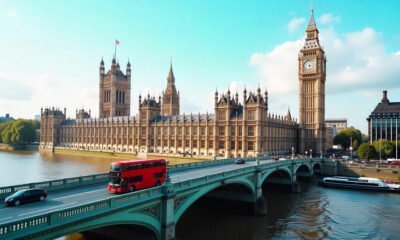Travel Guides & Articles
Now, Thailand Merges with Nigeria, India, South Sudan, and Venezuela in Facing Leading the World in Visa Rejections and Deportations in the US: What You Need to Know

Tuesday, July 15, 2025
Visa rejection and deportation continue to be key issues for travelers and immigrants worldwide. In 2025, countries across the globe are tightening their immigration policies, resulting in an increased number of deportations and visa denials. While many nations are grappling with their internal challenges, others have adopted stricter measures to maintain control over their borders. In 2025, a controversial shift in global immigration policies is shaking the travel world, with the US, India, Thailand, South Sudan, Venezuela, and Nigeria leading the charge in visa rejections and deportations. From the U.S. warning visa holders that they could face deportation even after approval, to India’s mass deportation drives and Thailand’s controversial Uyghur repatriations, the landscape of international travel is more uncertain than ever. As nations tighten their borders for political, security, and diplomatic reasons, travelers are finding themselves caught in the crossfire of stricter immigration enforcement. What does this mean for global mobility, and how will these policies affect travelers from around the world? The situation is evolving rapidly, and the consequences could be more far-reaching than anyone anticipated.
US Visa Holders Face Deportation Despite Approved Visas: A Wake-Up Call for Travelers
The U.S. Department of State has issued a stern warning that obtaining a U.S. visa does not automatically guarantee entry. Visa holders, especially those traveling to the United States from countries like India, are being reminded that failure to comply with all U.S. laws and immigration regulations can lead to deportation, even after a visa has been granted.
This announcement comes after a series of incidents where individuals were detained or deported after being found in violation of U.S. immigration rules, despite having valid visas. According to the U.S. Embassy in India, travelers must understand that obtaining a visa is only the first step, and full compliance with U.S. immigration laws is crucial.
The warning highlights that individuals who overstay their visa, engage in unauthorized employment, or misrepresent their status can have their visas revoked and face deportation. The embassy is increasingly utilizing digital tools to monitor visa holders and is implementing post-arrival checks to ensure compliance with immigration laws.
Travelers are urged to stay informed about the latest U.S. immigration regulations, as even minor violations can have serious consequences. This development has sparked concerns among visa holders, particularly in India, which has one of the highest numbers of U.S. visa holders globally.
India’s Deportation Drive: Impact on Foreign Nationals
India has also seen a rise in deportations in 2025, particularly involving individuals from Bangladesh and neighboring countries. The Indian government has launched a mass deportation campaign, particularly targeting suspected illegal immigrants from Bangladesh. These deportations are part of an ongoing effort to combat illegal immigration, following security concerns raised after a militant attack in the Pahalgam area of Jammu and Kashmir.
Reports indicate that thousands of individuals, primarily from Muslim communities in states like Gujarat and Assam, have been detained. In some cases, the deportations were carried out with little regard for international human rights standards. Many deportees were reportedly abandoned at the India-Bangladesh border or in the Bay of Bengal, raising concerns about the treatment of these individuals.
The Indian government has faced criticism for its harsh stance, with human rights organizations condemning the deportation practices. The country’s actions are under international scrutiny, with calls for more transparent and humane treatment of detainees. The consequences for travelers from neighboring countries who overstay or violate visa terms have become more severe, resulting in deportation without due process.
Thailand’s Controversial Deportation of Uyghurs
In February 2025, Thailand faced significant backlash after deporting 48 Uyghur Muslims back to China. Despite offers from countries such as the U.S., Canada, and Australia to resettle the Uyghurs, Thailand chose to deport them to China, where they faced a precarious future. Human rights groups and U.S. officials condemned the decision, citing Thailand’s compliance with China’s authoritarian immigration policies.
The deportations have raised alarms over the treatment of refugees and migrants in Southeast Asia, especially regarding the Chinese government’s ongoing repression of the Uyghur Muslim minority. Thailand’s actions have resulted in sanctions from international bodies, and the country’s immigration policies are under intense scrutiny.
For travelers in Southeast Asia, this case serves as a reminder of the complex political considerations that affect visa approvals and deportation risks. Thailand’s actions illustrate how international relations and internal policies can directly impact foreign nationals, even those who comply with legal immigration processes.
South Sudan: U.S. Visa Revocation and Deportation Ban
South Sudan has faced a unique diplomatic situation in 2025 involving visa revocations and deportation bans from the United States. After a dispute between South Sudan and the U.S. over the repatriation of a South Sudanese national, the U.S. revoked visas for all South Sudanese citizens residing in the United States. The U.S. also imposed a ban on any South Sudanese nationals entering the country.
The U.S. government stated that the ban and visa revocations would remain in effect until South Sudan cooperated in accepting deported nationals. This diplomatic impasse has left many South Sudanese nationals stranded, facing deportation from the U.S. and a lack of recourse to return home.
The South Sudanese government has yet to publicly address the issue, and the situation remains a tense point in U.S.-South Sudan relations. South Sudanese nationals abroad are being warned to comply with all immigration laws, as further actions may result in complications for future travel or residency in the U.S.
Venezuela: Deportation of Nationals to El Salvador
Venezuela has found itself at the center of a contentious deportation process led by the U.S. In March 2025, the U.S. deported 137 Venezuelan nationals to El Salvador, despite the individuals not having any criminal records. These deportations were carried out under the Alien Enemies Act, which allows the U.S. to remove individuals deemed a national security risk without individualized hearings.
The deportees were sent to a maximum-security detention center in El Salvador, where they faced harsh conditions, raising serious concerns about due process and human rights violations. The Venezuelan government condemned the deportations and has sought international assistance to prevent further removals of its nationals.
This situation highlights the challenges facing Venezuelans abroad, especially those attempting to gain refuge in the U.S. Travelers from Venezuela should be aware of the potential for deportation, even if they have complied with visa regulations, due to the political and diplomatic climate surrounding their country of origin.
Nigeria’s Resistance to Accepting Deportees
Nigeria has been at odds with the U.S. over its refusal to accept deported nationals, including Venezuelans who were sent back to Nigeria after their visa status was revoked in the U.S. Nigerian officials cited the country’s inability to handle the deported individuals due to internal challenges, such as overcrowded prisons and insufficient resources for reintegration programs.
The U.S. has pressured Nigeria and other African countries, including Guinea-Bissau and Liberia, to accept the deportees, but these nations have resisted, fearing the additional burden on their already strained systems. As a result, many deportees have been left in limbo, unable to return home or move forward with their lives.
For Nigerian nationals, this situation raises concerns about the possibility of deportation from other countries, particularly the U.S., and the lack of recourse for those facing potential legal action upon their return. Travelers should ensure they comply with immigration laws to avoid falling into similar predicaments.
Global Impact of Deportation Policies
The growing number of deportations and visa rejections across the globe is a reflection of rising nationalism and a tightening of borders in many countries. While some nations, such as the U.S., are focusing on security concerns and internal immigration issues, others like India and Thailand are using deportation as a political tool to assert sovereignty or comply with international pressures.
For travelers, this global trend signals the importance of staying up-to-date on visa policies and immigration regulations. It is essential for individuals to comply with all legal requirements, maintain accurate documentation, and be aware of the potential consequences of any immigration violations, whether intentional or not.
Navigating a New Immigration Landscape
In 2025, countries worldwide are increasingly prioritizing stricter immigration enforcement, resulting in more visa rejections and deportations. Whether due to security concerns, political tensions, or international agreements, travelers are facing heightened scrutiny and risks associated with non-compliance.
The U.S. warning about the potential for deportation even after visa approval serves as a reminder that securing a visa is only part of the process. Travelers must also adhere to the laws and regulations of the country they are visiting to avoid serious legal consequences. Similarly, nations like India, Thailand, South Sudan, Venezuela, and Nigeria highlight the growing global pressure on immigration systems, which is reshaping the landscape of travel and residency.
As international relations continue to evolve, travelers must stay informed and take proactive steps to ensure they are not caught in the crossfire of these changing immigration policies. The increasing complexity of global immigration laws requires individuals to be vigilant and adaptable, ensuring that their travel plans remain smooth and compliant with the laws of the countries they wish to visit.
Travel Guides & Articles
Kalka-Shimla toy train halted for third day due to rain; tourism and taxi sector hit | Latest News India

The iconic Kalka-Shimla toy train services remained suspended for the third consecutive day on Wednesday due to multiple landslides and track blockages caused by incessant rainfall across Himachal Pradesh, severely impacting the tourism and taxi business in the hill capital.
Continuous heavy rains for nearly a week have disrupted normal life in the state, blocking roads and damaging infrastructure. The Northern Railway has announced that all services on the UNESCO World Heritage narrow-gauge route will remain suspended until September 5 as engineers work to clear debris and repair damaged sections of the track, particularly near Datiyar in the Solan district, where a portion of the track has reportedly been washed away.
The suspension has hit local tourism-related businesses hard, especially during the monsoon season when many visitors prefer the toy train for its scenic yet relatively safe travel experience.
Luckey, President of the Taxi Union at Shimla Railway Station, told ANI that the halt in services has left many drivers struggling to make ends meet.
“The rain has caused a lot of trouble. Roads are blocked almost everywhere. Our business has been badly affected. The train was our only link, bringing in some tourists, but it has been closed for five days now. We are finding it hard to even cover our daily expenses,” Luckey said.
He added that while the Railway has officially notified suspension until September 5, the damage is extensive.
“They say landslides have occurred in multiple places and near Datiyar, the track itself is gone. Even here at the station, we have to leave our vehicles and walk to avoid damage, because trees are falling everywhere. Our livelihood was running only because of the train, but since it stopped, everything has come to a standstill,” he lamented.
Authorities have deployed teams to clear landslides and restore connectivity on the track, but with more rain forecast, the timeline for resumption of services remains uncertain.
The Kalka-Shimla toy train, built in 1903, a heritage train route is one of the region’s biggest tourist draws, offering panoramic views of the mountains, valleys, and colonial-era architecture. Its prolonged suspension during peak monsoon season is expected to cause further economic strain on those dependent on tourism in the city.
Travel Guides & Articles
India’s TBO to acquire Classic Vacations

India based travel distribution platform TBO has agreed to acquire Classic Vacations from Phoenix-based investment firm, The Najafi Companies.
The transaction value is estimated at up to $125 million.
The acquisition brings together TBO’s technology platform and worldwide inventory with Classic Vacations network of luxury travel advisors and suppliers.
Classic Vacations delivered revenue of $111 million and an operating EBITDA of $11.2 million in the fiscal year ended December 31, 2024.
“We’re thrilled to bring Classic Vacations into the TBO family – the company’s longstanding delivery of outstanding services has earned the trust of its more than 10,000 travel advisors in the U.S,” said Gaurav Bhatnagar, TBO’s co-founder and joint managing director.
“Classic Vacations is led by a strong team of experts and will continue as an independent brand.”
“As we start working on integrating Classic Vacations with TBO, we will remain open to similar strategic alliances going forward,” added Ankush Nijhawan, co-founder and co-managing director.
Melissa Krueger, CEO of Classic Vacations, added: “Together, we’re strengthening Classic Vacations’ position as the premier luxury partner in the market while extending our reach onto the global stage.”
Classic Vacations was bought by The Najafi Companies in 2021 from Expedia Group.
Classic Vacations has a large network of high-value travel advisors and deep ties with major American consortia.
It delivers premium service across hotels, air, experiences, car rentals, and travel protection, specializing in bespoke luxury itineraries.
Related News Stories: Partner News – TravelMole
Travel Guides & Articles
Govt allows select minorities to stay in India without passport

The Union Home Ministry on Monday, September 1, issued an order announcing that the government now exempts minority communities, namely, Hindu, Sikh, Buddhist, Jain, Parsi and Christian fleeing religious persecution from Afghanistan, Bangladesh, and Pakistan, who entered the country by December 31, 2024, without requiring valid passports or travel documents.
“A person belonging to a minority community in Afghanistan, Bangladesh and Pakistan, namely, Hindu, Sikh, Buddhist, Jain, Parsi and Christian, who was compelled to seek shelter in India due to religious persecution or fear of religious persecution and entered into India on or before the 31st December, 2024,” read the order from the home ministry.
Interestingly, the order did not name Muslims. This is in line with the BJP-led government’s Citizenship Amendment Act (CAA) that was passed in 2019 to facilitate this. It had le to severe protests from Muslims and other citizens who said the law is discriminatory in nature and that it can also be misused to disenfranchise Muslims in the country.
In fact, over the last few months the central government and BJP-led state governments have been targeting Indian Muslims from West Bengal who were being picked up on false allegations of being Bangladeshi citizens. Several prominent activists including Umar Khalid and Sharjeel Imam are currently in jail having spent nearly five years in prison on charges of inciting riots in Delhi amid the anti-CAA protests.
It was issued as part of a series of directives made public by the Union Home Ministry, under the newly enacted Immigration and Foreigners Act, 2025, which came into effect on Monday, September 1.
The Immigration and Foreigners Bill, 2025, aims to grant the Union government the power to control the entry and exit of individuals into and from India by regulations that outline requirements for travel documents, such as passports, and govern various aspects of foreign nationals’ stay, including visa rules, registration procedures, and other related matters.
Previously, the Citizenship Amendment Act (CAA), which was enforced last year, extended the eligibility for citizenship only to non-Muslim minorities from Afghanistan, Bangladesh, and Pakistan who entered India on or before December 31, 2014.
While the recent directive allows certain individuals to stay in India without documentation if they arrived by December 31, 2024, it doesn’t guarantee citizenship.
In contrast, the 2019 Citizenship Amendment Act offers a path to citizenship for persecuted non-Muslim minorities from Pakistan, Afghanistan, and Bangladesh who entered India before December 2014.
The CAA’s exclusion of Muslims sparked widespread protests and concerns about discrimination, secularism, and potential disenfranchisement.
-

 Business5 days ago
Business5 days agoThe Guardian view on Trump and the Fed: independence is no substitute for accountability | Editorial
-
Tools & Platforms3 weeks ago
Building Trust in Military AI Starts with Opening the Black Box – War on the Rocks
-

 Ethics & Policy1 month ago
Ethics & Policy1 month agoSDAIA Supports Saudi Arabia’s Leadership in Shaping Global AI Ethics, Policy, and Research – وكالة الأنباء السعودية
-

 Events & Conferences4 months ago
Events & Conferences4 months agoJourney to 1000 models: Scaling Instagram’s recommendation system
-

 Jobs & Careers2 months ago
Jobs & Careers2 months agoMumbai-based Perplexity Alternative Has 60k+ Users Without Funding
-

 Education2 months ago
Education2 months agoVEX Robotics launches AI-powered classroom robotics system
-

 Funding & Business2 months ago
Funding & Business2 months agoKayak and Expedia race to build AI travel agents that turn social posts into itineraries
-

 Podcasts & Talks2 months ago
Podcasts & Talks2 months agoHappy 4th of July! 🎆 Made with Veo 3 in Gemini
-

 Podcasts & Talks2 months ago
Podcasts & Talks2 months agoOpenAI 🤝 @teamganassi
-

 Education2 months ago
Education2 months agoMacron says UK and France have duty to tackle illegal migration ‘with humanity, solidarity and firmness’ – UK politics live | Politics





















